News
Valio to set science-based climate targets
2 Mar 2020
Valio says it is the first Finnish food company to set climate targets in line with the Paris Agreement
Owned by Finnish milk suppliers, Valio has committed to set scientifically assessed targets to reduce greenhouse gas emissions (Science Based Targets). Valio had already announced that it is aiming for a net zero carbon footprint for milk by 2035. The targets to be set during 2020 are based on the Paris climate agreement: climate warming must be limited to 1.5°C.

The aim of the Science Based Targets (SBT) organisation is that companies’ climate targets are based on science and create significant reductions in emissions. Members of the organisation include WWF, UN Global Compact, CDP, and World Resources Institute. The Science Based Targets organisation scientifically and independently assesses and approves companies’ targets.
“Climate change is the biggest global challenge of our time. We know the impacts of our own operations from the farm to the store shelf, and we want to be part of the solution. Big companies have a significant opportunity to make an impact and, at the same time, a responsibility to mitigate climate change. That is why we too are participating,” said Juha Nousiainen, Director of Valio’s carbon neutral milk chain.
Valio says it has an ambitious climate programme under way to bring the carbon footprint of milk to zero. Science-based SBT targets will be linked with the ongoing work and targets.
Valio says it was the first dairy in the world to publish over a year ago a climate programme aiming for carbon-neutral milk. The co-op says its most important goals are to strengthen the carbon sinks of grasslands, reduce emissions from peatlands drained from wetlands, and put manure to use. In the future, manure will be increasingly used to produce biogas as a replacement for the fossil fuels used in transportation. At the same time, the valuable nutrients will be recycled.
For example, over 200 Valio dairy farms have participated in the carbon farmer training organised in collaboration with Baltic Sea Action Group. And the CARBO projects are researching carbon sequestration of grass in partnership with the Finnish Meteorological Institute, Natural Resources Institute Finland (Luke), University of Eastern Finland.
Valio notes that a significant share, over 90%, of milk’s carbon footprint originates at the dairy farm before a milk truck enters the dairy gates. As such, it says, cearly, the emissions of the entire value chain – from cows to production plants to logistics – will be part of its future SBT targets. More specific targets approved by an independent body will help it to advance in its climate work, Nousiainen adds.
Valio aims to receive approval for its Science Based Targets during 2020.
Related news
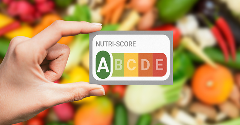
Danone removes NutriScore from products
20 Sep 2024
Following an algorithm update that gives some of its sweetened drinks a worse score, Danone has removed the front-of-pack label, NutriScore, from all of its products – putting profit before public health, say campaigners.
Read more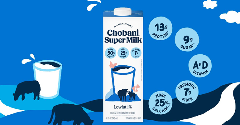
Chobani develops shelf-stable, prebiotic-enriched Super Milk
12 Sep 2024
Chobani has launched a prebiotic-enriched, shelf-stable, high-protein dairy milk to support people in disaster zones who need a nutritious drink that does not require refrigeration.
Read more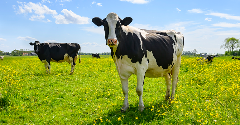
Tesco trials methane mitigation supplement for dairy cattle
5 Sep 2024
Tesco is trialing a methane-reducing feed supplement for one of its key UK dairy farms, sustainable UK milk producer Grosvenor Farms.
Read more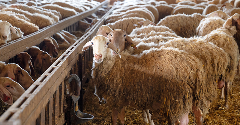
Sheep and goat plague: A new threat to Greece’s feta production
27 Aug 2024
A recent goat and sheep plague outbreak threatens feta production in Greece. The flagship product accounts for roughly 10% of the country’s food exports, but Greek authorities say there is no cause for concern.
Read more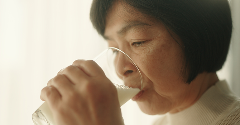
Nestlé develops a new fat reduction method for dairy ingredients
26 Aug 2024
A Brazil-based Nestlé research and development team has developed a way to reduce the fat in milk powder by as much as 60%, without impacting the key characteristics that consumers enjoy.
Read more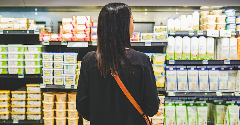
Dutch court rules against plant-based butter brand ‘Roombeter’: Only dairy products allowed to use the word ‘cream’
26 Jul 2024
A Dutch court has ruled against Upfield’s plant-based butter, Roombeter, stating that its use of the word ‘room’ (cream) in the product name violates European regulations that protect dairy-related terms allowed for dairy products only.
Read more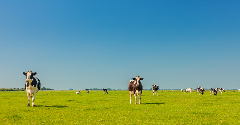
How will Denmark’s 2030 carbon tax impact farming?
12 Jul 2024
Denmark has announced plans to implement Europe’s first carbon tax on agriculture from 2030, targetting the farming sector’s CO2 emissions. How will it be implemented and how have farmers reacted?
Read more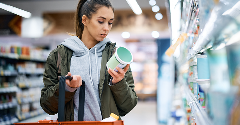
Sweden updates front-of-pack Keyhole labelling rules
11 Jul 2024
The Swedish Food Agency has announced updates to the voluntary Keyhole logo, used in four Nordic countries, following recommendations to improve nutrition labelling.
Read more
Consumers dislike faba beans’ sensory profile
3 Jun 2024
Consumers display low acceptance of faba beans, with sensory properties such as bitterness a core concern, a study suggests. However, for product varieties such as cocoa-free chocolate, this attribute could prove to be a benefit.
Read more
Food scientists uncover new way to preserve nutrient and flavour quality
29 May 2024
Researchers have developed a method that guarantees food safety for low-moisture products, such as dried milk, while maximising quality by retaining vitamins, minerals, and flavours, they say.
Read more